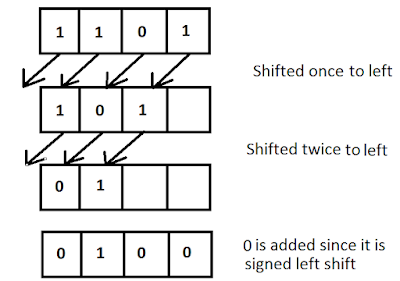Operators
OPERATORS
The operations in java are represented by Operators and the objects of operation are called Operands. Java has a rich set of operators which includes:-
- Arithmetic operators - These operators are used for arithmetic operations. The five basic arithmetic operations are addition, subtraction, multiplication, division and modulus. There are 2 types of arithmetic operators which includes:-
- Unary - It includes unary + and - . For example:-
int a= 5;
int b= +a;
int c= -a;
Here b will store +5 or simply 5 while c will store -5. So unary operators are used to change the sign and are always used against 1 operand.
- Binary - It includes binary +, -, *, /, %. These operands are used for addition, subtraction, multiplication, division and modulus.
2. Increment/Decrement Operators - The ++ is increment operator while -- is decremment operator. For example:-
int a=5;
a++; or ++a;
int b=6;
b--; or --b;
Here a++ or ++a both are similar to a=a+1
Similarly b-- or --b are similar to b= b-1
Therefore a will store 6 while b will store 5
Now there are two types of increment/decrement operators ;-
- Preincrement/Predecrement - The ++a or --b were the preincrement/predecrement operators. In this case 1st the the values are incremented or decremented then the operation is done. For example:-
int a=5,b=6;
int c=(++a)+b;
int d=(--b)+a;
Here the operation is addition. Thus
c=(++5)+6
= 6+6
=12
Therefore a=6,b=6,c=12. Again,
d=(--6)+6 [Note:- The value of a has been changed from 5 to 6]
=5+6
=11
Therefore d=11,a=6,b=5
3. Relational Operators - Relational operators refer to relationship that values can have with one another. Java provides six relational operators < (less than) , >(greater than),<=(less than or equal to), >=(greater than or equal to), ==(equal to equal to), !=(not equal to).
4. Logical Operators - Java supports 6 logical operators namely &(and), |(or), ^(xor), &&(and and), ||(or or), !(not).
5. Assignment operator : - There is one assignment operator which is =. This operator is used to assign a value to a variable. For example:-
int a=5;
Here 5 is the value which is assigned to a.
6. Shift Operator :- The three shift operators are >> (signed right shift), <<(signed left shift), >>> (unsigned right shift). Let us take an example :-
1101>>2=?
Finally let us consider 1101>>>2=?
a+=10;
int a=5;
Here 5 is the value which is assigned to a.
6. Shift Operator :- The three shift operators are >> (signed right shift), <<(signed left shift), >>> (unsigned right shift). Let us take an example :-
1101>>2=?
Now let us take the example for 1101<<2 =?
Finally let us consider 1101>>>2=?
7. Shorthand operators :- Java offers special shorthand operators that simplify the coding of a certain type of assignment statement. For example :-
a=a+10;
can also be written as
a+=10;
8. Conditional Operator - Java provides a conditional operator which provides a value according to the given condition. The syntax is :-
condition ? statement1 : statement2 ;
Here if the condition given is true, then statement 1 is executed and if the condition is false then the statement 2 is executed.
For example :-
int a=5,b=6;
a>b?System.out.println(a):System.out.println(b);
Here the output will be 6.










Comments
Post a Comment